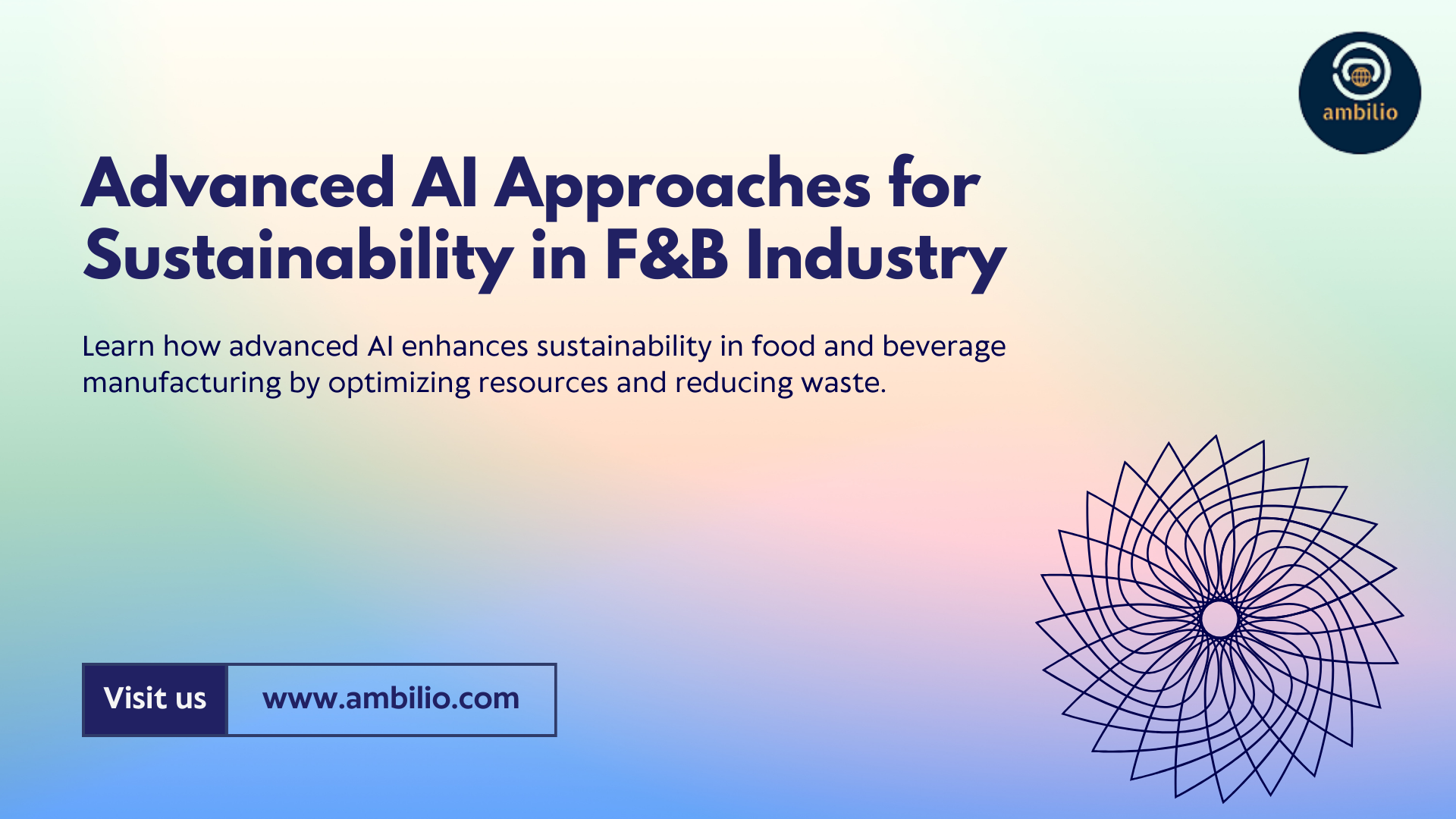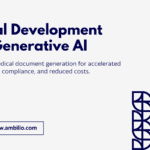The food and beverage industry faces increasing pressure to adopt sustainable practices as consumers and regulatory bodies demand greater accountability for environmental impact. Resource scarcity, climate change, and waste management challenges have placed sustainability at the forefront of business strategies in this sector. Advanced Artificial Intelligence offers innovative solutions that can significantly enhance sustainability initiatives by optimizing resource usage, reducing waste, and improving overall operational efficiency. This article explores how food and beverage manufacturers can leverage AI technologies to create more sustainable and eco-friendly practices.
The Role of AI in Sustainability for Food and Beverage
AI’s ability to analyze vast amounts of data and generate actionable insights makes it an essential tool for companies striving to achieve sustainability goals. By collecting and processing real-time data, AI can help businesses monitor their resource usage, optimize processes, and implement waste reduction strategies. It enables continuous improvement in sustainability by identifying inefficiencies and providing data-driven recommendations for reducing environmental impact.
Below are key areas where AI can drive significant improvements in sustainability within the food and beverage industry.
1. Tracking and Monitoring Sustainability Efforts
One of the most important steps in achieving sustainability is the ability to track resource consumption and environmental impact in real time. AI enables companies to gather and analyze data on various sustainability metrics, such as energy use, water consumption, and waste generation.
- Identifying Resource Usage Patterns: AI systems can analyze historical data to detect patterns in resource consumption. This helps businesses identify areas where they may be using more resources than necessary, such as excess water or energy in production processes. By understanding these patterns, companies can implement measures to improve efficiency and reduce their resource footprint.
- Setting Benchmarks and Goals: AI tools enable companies to set benchmarks based on past performance and establish realistic sustainability goals. These systems can automatically track progress toward these targets, providing real-time updates on how well the company is doing in meeting its sustainability objectives. This continuous monitoring is crucial for making informed decisions and ensuring that sustainability goals remain on track.
2. Optimizing Resource Usage with Predictive Analytics
AI can significantly optimize resource utilization by predicting demand, improving energy efficiency, and dynamically allocating resources. This capability helps manufacturers ensure that they are using only the resources they need, thus reducing waste and lowering environmental impact.
- Predictive Analytics for Demand Forecasting: AI algorithms can forecast demand for raw materials, energy, and water based on factors such as historical sales data, market trends, and weather conditions. By accurately predicting demand, companies can plan their resource procurement and production schedules accordingly. This not only prevents overproduction—which often leads to waste—but also ensures that resources are used more efficiently.
- Dynamic Resource Allocation: AI systems can adjust resource allocation in real-time, based on supply and demand conditions. For example, if certain ingredients are in surplus, AI can suggest using them in production before they expire. This dynamic management of resources minimizes waste and ensures that companies are making the most of their available inputs.
- Energy Management: AI can help optimize energy consumption by analyzing patterns and identifying opportunities for improvement. For instance, AI might suggest adjusting production schedules to take advantage of off-peak energy times, reducing both costs and environmental impact. By managing energy more effectively, companies can reduce their carbon footprint and contribute to global sustainability efforts.
3. Waste Management Improvement
Reducing waste is a critical component of any sustainability initiative. AI can significantly improve waste management by identifying inefficiencies, optimizing recycling processes, and providing insights into product lifecycle assessments.
- Waste Reduction Strategies: AI can analyze production processes to identify inefficiencies that lead to waste. For example, it may detect areas where raw materials are being overused or where machinery is producing excess by-products. Based on these insights, companies can make adjustments to minimize waste during production, leading to cost savings and improved sustainability.
- Recycling Optimization: AI-driven systems can optimize sorting and processing of recyclable materials, ensuring that waste is properly classified and processed. This not only increases the efficiency of recycling operations but also helps divert more waste from landfills, contributing to a circular economy.
- Lifecycle Analysis: AI can conduct comprehensive lifecycle assessments of food and beverage products, evaluating their environmental impact from sourcing to disposal. By understanding the full lifecycle of their products, companies can identify areas for improvement and develop strategies to minimize environmental harm.
4. Enhancing Supply Chain Sustainability
AI can play a crucial role in optimizing the entire supply chain, from sourcing raw materials to delivering finished products. By improving logistics, supplier evaluation, and inventory management, AI helps companies reduce emissions and improve resource efficiency across the board.
- Supplier Assessment: AI tools can evaluate suppliers based on their sustainability practices, helping companies choose partners that align with their environmental goals. This not only ensures that sustainability is maintained throughout the supply chain but also encourages suppliers to adopt more eco-friendly practices.
- Logistics Optimization: AI systems can optimize transportation routes, reducing fuel consumption and emissions. By analyzing traffic patterns, weather conditions, and delivery schedules, AI can recommend the most efficient routes for product distribution. This minimizes the environmental impact of logistics while also lowering transportation costs.
- Inventory Management: Accurate demand forecasting through AI reduces the risk of overstocking, which often leads to waste, especially with perishable goods. By optimizing inventory management, companies can ensure that they produce only what is needed, reducing excess inventory and preventing spoilage.
5. Continuous Improvement and Automated Reporting
Sustainability is a continuous process that requires ongoing monitoring and adjustment. AI enables companies to continuously improve their sustainability efforts through automated reporting, feedback loops, and data-driven decision-making.
- Automated Reporting: AI can generate detailed reports on sustainability metrics, making it easier for companies to communicate their progress to stakeholders and comply with regulatory requirements. These reports can include information on resource usage, waste management, and greenhouse gas emissions, providing a clear picture of the company’s environmental performance.
- Feedback Loops: AI systems create feedback loops that allow companies to learn from their sustainability efforts. For instance, if a particular initiative is not delivering the expected results, AI can suggest modifications or alternative strategies. This enables businesses to adjust their sustainability initiatives in real-time and continue making progress toward their environmental goals.
Final Words
In the food and beverage industry, AI is a powerful tool for enhancing sustainability initiatives by optimizing resource usage, reducing waste, and improving supply chain efficiency. Through predictive analytics, real-time tracking, and continuous improvement, AI enables companies to make smarter decisions that benefit both their bottom line and the environment.
As the industry continues to evolve, adopting advanced AI technologies will be essential for businesses seeking to meet the growing demand for sustainable practices while maintaining profitability and operational efficiency. By leveraging AI, food and beverage manufacturers can not only improve their environmental impact but also gain a competitive edge in an increasingly eco-conscious market.



